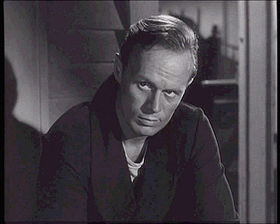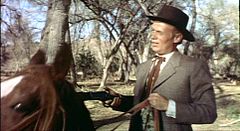Richard Widmark
From Wikipedia, the free encyclopedia
| Richard Widmark | |
|---|---|

Widmark in the trailer for Panic in the Streets (1950)
|
|
| Born | Richard Weedt Widmark December 26, 1914 Sunrise Township, Minnesota, U.S. |
| Died | March 24, 2008 (aged 93) Roxbury, Connecticut, U.S. |
| Years active | 1938–2001 |
| Spouse(s) | Jean Hazlewood (m. 1942–97) (her death) 1 child Susan Blanchard (m. 1999–2008) (his death) |
| Children | Anne Heath Widmark |
He was nominated for an Academy Award for his role as the villainous Tommy Udo in his debut film, Kiss of Death, for which he also won the Golden Globe Award for Most Promising Newcomer. Early in his career Widmark specialized in similar villainous or anti-hero roles in films noir, but he later branched out into more heroic leading and support roles in westerns, mainstream dramas and horror films, among others.
For his contribution to the motion picture industry, Widmark has a star on the Hollywood Walk of Fame at 6800 Hollywood Boulevard. In 2002, he was inducted into the Western Performers Hall of Fame at the National Cowboy & Western Heritage Museum in Oklahoma City, Oklahoma.
Contents
Early life
Widmark was born in Sunrise Township, Minnesota,[1] the son of Ethel Mae (née Barr) and Carl Henry Widmark.[2][3] His father was of Swedish descent and his mother of English and Scottish ancestry.[4] Widmark grew up in Princeton, Illinois, and also lived in Henry, Illinois for a short time, moving frequently because of his father's work as a traveling salesman.[5] He attended Lake Forest College, where he studied acting and also taught acting after he graduated.Radio
Widmark made his debut as a radio actor in 1938 on Aunt Jenny's Real Life Stories. In 1941 and 1942, he was heard daily on the Mutual Broadcasting System in the title role of the daytime serial Front Page Farrell, introduced each afternoon as "the exciting, unforgettable radio drama... the story of a crack newspaperman and his wife, the story of David and Sally Farrell." Farrell was a top reporter for the Brooklyn Eagle. When the series moved to NBC, Widmark turned the role over to Carleton G. Young and Staats Cotsworth.During the 1940s, Widmark was also heard on such network radio programs as Gang Busters, Inner Sanctum Mysteries, Joyce Jordan, M.D., Molle Mystery Theater, Suspense and Ethel and Albert. In 1952 he portrayed Cincinnatus Shryock in an episode of "Cavalcade of America" entitled "Adventure on the Kentucky". He returned to radio drama decades later, performing on CBS Radio Mystery Theater (1974–82), and was also one of the five hosts on Sears Radio Theater (as the Friday "adventure night" host) from 1979-81.
Broadway and films
Widmark appeared on Broadway in 1943 in F. Hugh Herbert's Kiss and Tell. He was unable to join the military during World War II because of a perforated eardrum. He was in Chicago appearing in a stage production of Dream Girl with June Havoc when 20th Century Fox signed him to a seven-year contract.[6]Widmark's first movie appearance was in 1947's Kiss of Death, as the giggling, sociopathic villain Tommy Udo.[7] His most notorious scene found Udo pushing a wheelchair-bound woman (played by Mildred Dunnock) down a flight of stairs to her death.[5] Widmark was almost not cast. He said, "The director, Henry Hathaway, didn't want me. I have a high forehead; he thought I looked too intellectual." Hathaway was overruled by studio boss Darryl F. Zanuck. "Hathaway gave me kind of a bad time," recalled Widmark.[6] Kiss of Death was a commercial and critical success: Widmark won the Golden Globe Award for New Star Of The Year - Actor, and was nominated for the Academy Award for Best Supporting Actor for his performance.[7] Widmark's character was also the inspiration for the song The Ballad of Tommy Udo by the band Kaleidoscope. Widmark played "Dude" in the Western film Yellow Sky with Gregory Peck and Anne Baxter the following year, with his name over the title, billed third.
In 1950, Widmark co-starred with Paul Douglas, Barbara Bel Geddes, Jack Palance and Zero Mostel in Elia Kazan's Panic in the Streets, and appeared opposite Gene Tierney in Jules Dassin's Night and the City. Both are considered classic examples of film noir. Also in 1950, Widmark starred with Sidney Poitier in the gripping racial melodrama No Way Out.
In 1952, Widmark had his handprints cast in cement at Grauman's Chinese Theatre. During his stint at Fox, he appeared in The Street with No Name (1948), Don't Bother to Knock (1952) with Marilyn Monroe, and Samuel Fuller's Pickup on South Street (1953). He also appeared in Vincente Minnelli's 1955 cult film The Cobweb with Lauren Bacall.
Widmark starred in and also produced a drama set during the Cold War, The Bedford Incident (1965). He is also credited with producing his films Time Limit (1957) and The Secret Ways (1961). Other notable films in the 1960s were The Alamo (1960) with John Wayne as Davy Crockett and Widmark as Jim Bowie, Judgment at Nuremberg (1961), How the West Was Won (1962), and John Ford's Two Rode Together (1961) and Cheyenne Autumn (1964). During the 1970s, Widmark's films included Murder on the Orient Express (1974), Michael Crichton's Coma (1978), and The Swarm (1978). In all, Widmark appeared in over 60 films before making his final movie appearance in the 1991 thriller True Colors.[1]
Television
Widmark was a guest on What's My Line? in 1954. The following year, he made a rare foray into comedy on I Love Lucy, portraying himself when a star-struck Lucy trespasses onto his property to steal a souvenir. Widmark finds Lucy sprawled out on his living room floor underneath a bear skin rug.Returning to television in the early 1970s, Widmark received an Emmy nomination for his performance as Paul Roudebush, the President of the United States, in the TV movie Vanished! (1971), a Fletcher Knebel political thriller. In 1972-73, he reprised his detective role from Don Siegel's Madigan (1968) with six 90-minute episodes on the NBC Wednesday Mystery Movie. The next year, he participated in a mini-series about Benjamin Franklin, transmitted in 1974, which was a unique experiment of four 90-minute dramas, each with a different actor impersonating Franklin: Widmark, Beau Bridges, Lloyd Bridges, Eddie Albert, Melvyn Douglas, and (portraying Franklin at age 12) Willie Aames. The series won a Peabody Award and five Emmys. During the 1980s, Widmark returned to TV with a half-dozen TV movies.
Personal life and death
Green City, Missouri, is the site of Widmark Airport (FAA LID: MO83) in extreme northeastern Missouri. Towns the size of Green City, whose population numbered only 688 inhabitants in 2000, usually do not have airports, but Widmark owned a cattle ranch in the area during the 1950s and 1960s. Widmark contributed funds to the construction of an airport which led to its being named in his honor.
Despite having spent most of his career appearing countless times in gun-toting roles such as cowboys, policemen, gangsters and military men, Widmark actually loathed real-life gunplay, and he got involved in several gun-control initiatives and drives. In 1976, he famously stated:[8]
"I know I've made kind of a half-assed career out of violence, but I abhor violence. I am an ardent supporter of gun control. It seems incredible to me that the United States are the only civilized nation that does not put some effective control on guns."Having retired in 2001, Widmark died, after a long illness, on March 24, 2008, at his home in Roxbury, Connecticut at the age of 93. Widmark's illness had been aggravated by a fall he had suffered during the previous year. At the 2009 Academy Awards, Richard Widmark was honored in the Memorial Tribute. His interment was at Roxbury's cemetery.
Filmography
- Kiss of Death (1947)
- The Street with No Name (1948)
- Road House (1948)
- Yellow Sky (1948)
- Down to the Sea in Ships (1949)
- Slattery's Hurricane (1949)
- Night and the City (1950)
- Panic in the Streets (1950)
- No Way Out (1950)
- Halls of Montezuma (1950)
- The Frogmen (1951)
- Red Skies of Montana (1952)
- Don't Bother to Knock (1952)
- O. Henry's Full House (1952)
- My Pal Gus (1952)
- Destination Gobi (1953)
- Pickup on South Street (1953)
- Take the High Ground! (1953)
- Hell and High Water (1954)
- Garden of Evil (1954)
- Broken Lance (1954)
- A Prize of Gold (1955)
- The Cobweb (1955)
- Backlash (1956)
- Run for the Sun (1956)
- The Last Wagon (1956)
- Saint Joan (1957)
- Time Limit (1957)
- The Law and Jake Wade (1958)
- The Tunnel of Love (1958)
- The Trap (1959)
- Warlock (1959)
- The Alamo (1960)
- The Secret Ways (1961)
- Two Rode Together (1961)
- Judgment at Nuremberg (1961)
- How the West Was Won (1962)
- The Long Ships (1964)
- Flight from Ashiya (1964)
- Cheyenne Autumn (1964)
- The Bedford Incident (1965)
- Alvarez Kelly (1966)
- The Way West (1967)
- Madigan (1968)
- A Talent for Loving (1969)
- Death of a Gunfighter (1969)
- The Moonshine War (1970)
- Vanished (1971) (TV)
- When the Legends Die (1972)
- Brock's Last Case (1973)
- Murder on the Orient Express (1974)
- The Last Day (1975) (TV)
- To the Devil a Daughter (1976)
- The Sell-Out (1976)
- Twilight's Last Gleaming (1977)
- The Domino Principle (1977)
- Rollercoaster (1977)
- Coma (1978)
- The Swarm (1978)
- Mr. Horn (1979) (TV)
- Bear Island (1979)
- All God's Children (1980) (TV)
- A Whale for the Killing (1981) (TV)
- National Lampoon Goes to the Movies (1982)
- Hanky Panky (1982)
- Who Dares Wins (1982)
- Against All Odds (1984)
- Blackout (1985) (TV)
- A Gathering of Old Men (1987) (TV)
- Once Upon a Texas Train (1988) (TV)
- Cold Sassy Tree (1989) (TV)
- True Colors (1991)
- Lincoln (1992) (voice, documentary)
- Wild Bill: Hollywood Maverick (1996) (documentary)
- Dobe and a Company of Heroes (2001) (documentary)
- Screen Snapshots: Hopalong in Hoppy Land (1951)
- Screen Snapshots: Hollywood Night Life (1952)
- 1955 Motion Picture Theatre Celebration (1955)
- Shooting the Moonshine War (1970)
References
- ^ Jump up to: a b "Sunrise: Birthplace of Hollywood Actor Richard Widmark". Sunrise Township. Retrieved 2008-03-26.
- Jump up ^ Richard Widmark Biography (1914-)
- Jump up ^ [1]
- Jump up ^ 'Juvenile' in Gangster Role Reaches Apex of Terror
- ^ Jump up to: a b Aljean Harmetz (2008-03-26). "Actor Richard Widmark Dies at 93". The New York Times. Retrieved 2008-03-26.
- ^ Jump up to: a b "Actor Richard Widmark Dies," Daily News, March 26, 2008.
- ^ Jump up to: a b "Tough-guy actor Richard Widmark dies at 93". Associated Press at CNN. 2008-03-26. Archived from the original on March 28, 2008. Retrieved 2008-03-26.
- Jump up ^ David Hinckley (March 26, 2008). "Actor Richard Widmark dies". New York Daily News. Retrieved April 12, 2011.
External links
| Wikimedia Commons has media related to Richard Widmark. |



No comments:
Post a Comment
Please leave a comment-- or suggestions, particularly of topics and places you'd like to see covered